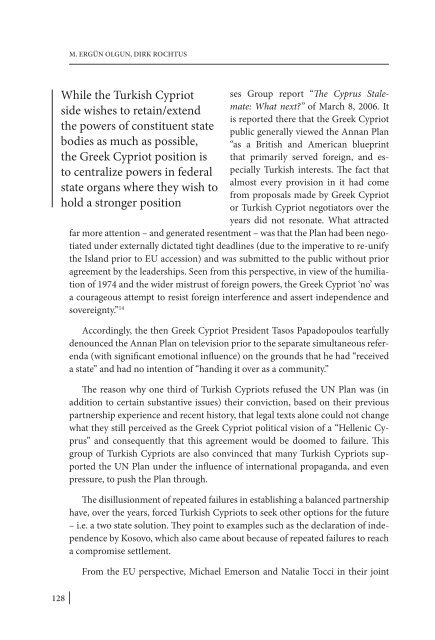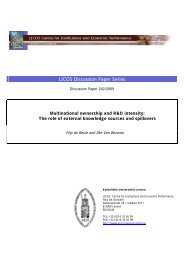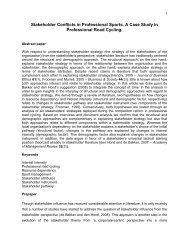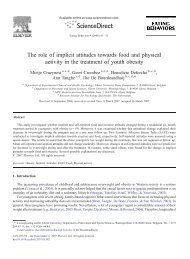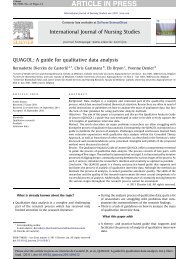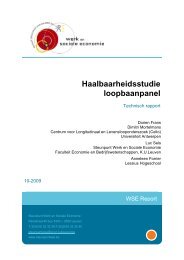View/Open - Lirias@Lessius
View/Open - Lirias@Lessius
View/Open - Lirias@Lessius
You also want an ePaper? Increase the reach of your titles
YUMPU automatically turns print PDFs into web optimized ePapers that Google loves.
128<br />
M. ERGÜN OLGUN, DIRK ROCHTUS<br />
While the Turkish Cypriot<br />
side wishes to retain/extend<br />
the powers of constituent state<br />
bodies as much as possible,<br />
the Greek Cypriot position is<br />
to centralize powers in federal<br />
state organs where they wish to<br />
hold a stronger position<br />
ses Group report “The Cyprus Stalemate:<br />
What next?” of March 8, 2006. It<br />
is reported there that the Greek Cypriot<br />
public generally viewed the Annan Plan<br />
“as a British and American blueprint<br />
that primarily served foreign, and especially<br />
Turkish interests. The fact that<br />
almost every provision in it had come<br />
from proposals made by Greek Cypriot<br />
or Turkish Cypriot negotiators over the<br />
years did not resonate. What attracted<br />
far more attention – and generated resentment – was that the Plan had been negotiated<br />
under externally dictated tight deadlines (due to the imperative to re-unify<br />
the Island prior to EU accession) and was submitted to the public without prior<br />
agreement by the leaderships. Seen from this perspective, in view of the humiliation<br />
of 1974 and the wider mistrust of foreign powers, the Greek Cypriot ‘no’ was<br />
a courageous attempt to resist foreign interference and assert independence and<br />
sovereignty.” 14<br />
Accordingly, the then Greek Cypriot President Tasos Papadopoulos tearfully<br />
denounced the Annan Plan on television prior to the separate simultaneous referenda<br />
(with significant emotional influence) on the grounds that he had “received<br />
a state” and had no intention of “handing it over as a community.”<br />
The reason why one third of Turkish Cypriots refused the UN Plan was (in<br />
addition to certain substantive issues) their conviction, based on their previous<br />
partnership experience and recent history, that legal texts alone could not change<br />
what they still perceived as the Greek Cypriot political vision of a “Hellenic Cyprus”<br />
and consequently that this agreement would be doomed to failure. This<br />
group of Turkish Cypriots are also convinced that many Turkish Cypriots supported<br />
the UN Plan under the influence of international propaganda, and even<br />
pressure, to push the Plan through.<br />
The disillusionment of repeated failures in establishing a balanced partnership<br />
have, over the years, forced Turkish Cypriots to seek other options for the future<br />
– i.e. a two state solution. They point to examples such as the declaration of independence<br />
by Kosovo, which also came about because of repeated failures to reach<br />
a compromise settlement.<br />
From the EU perspective, Michael Emerson and Natalie Tocci in their joint


